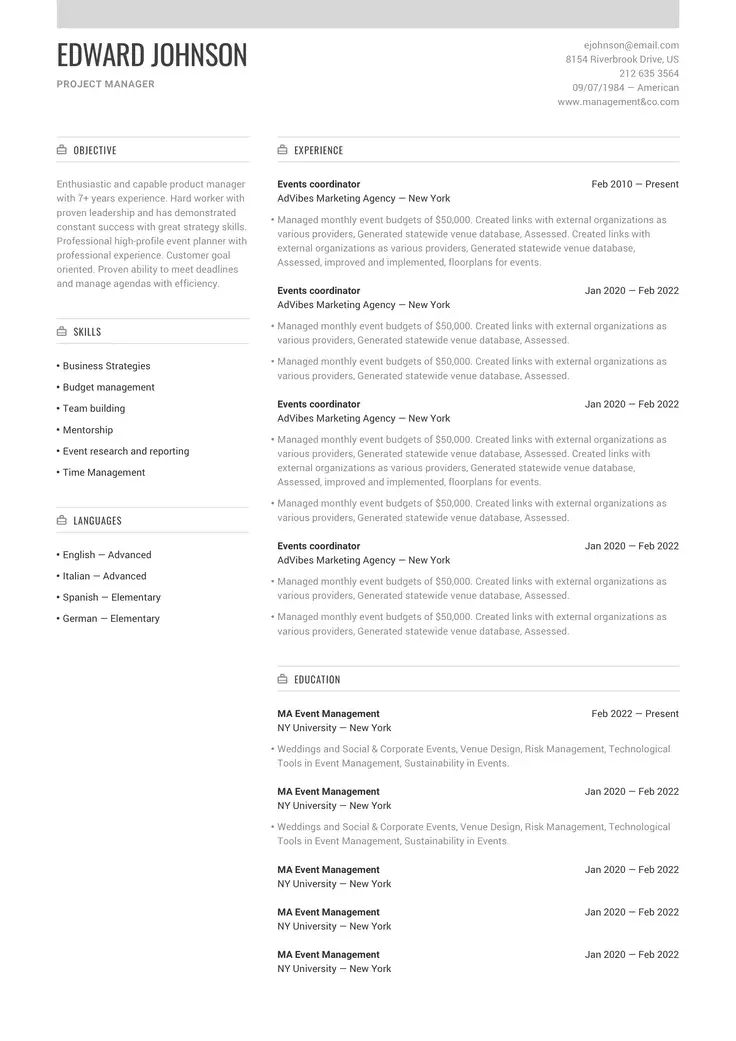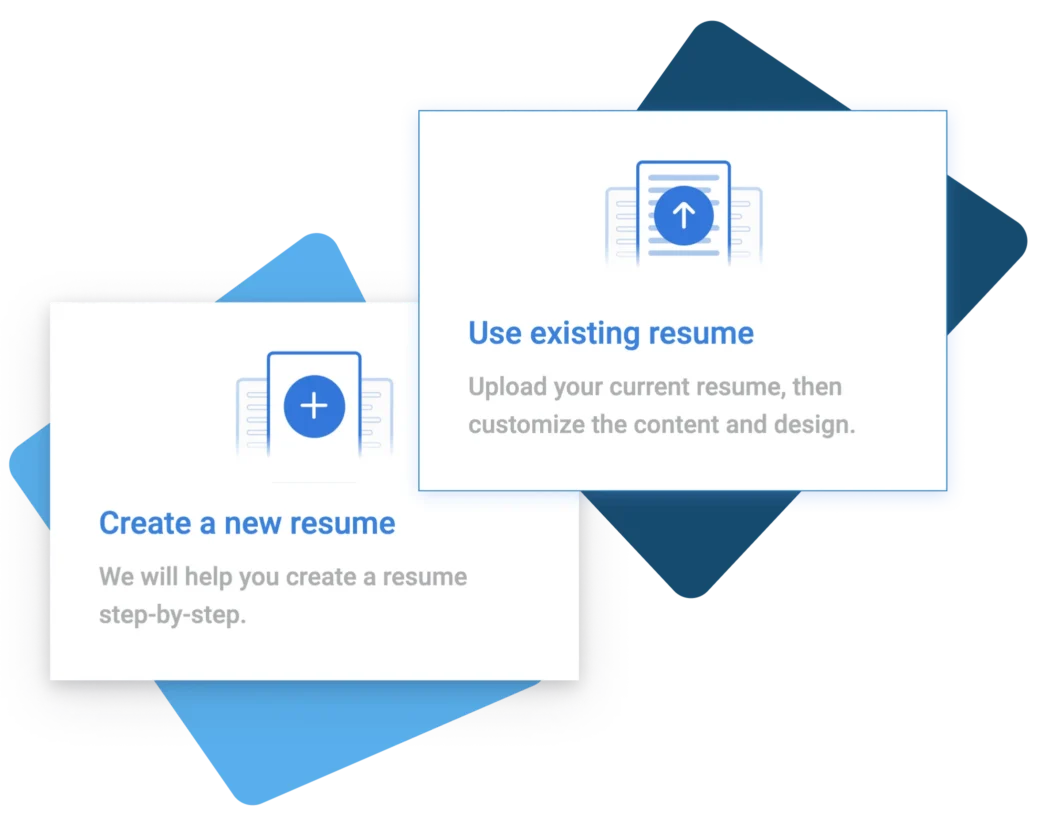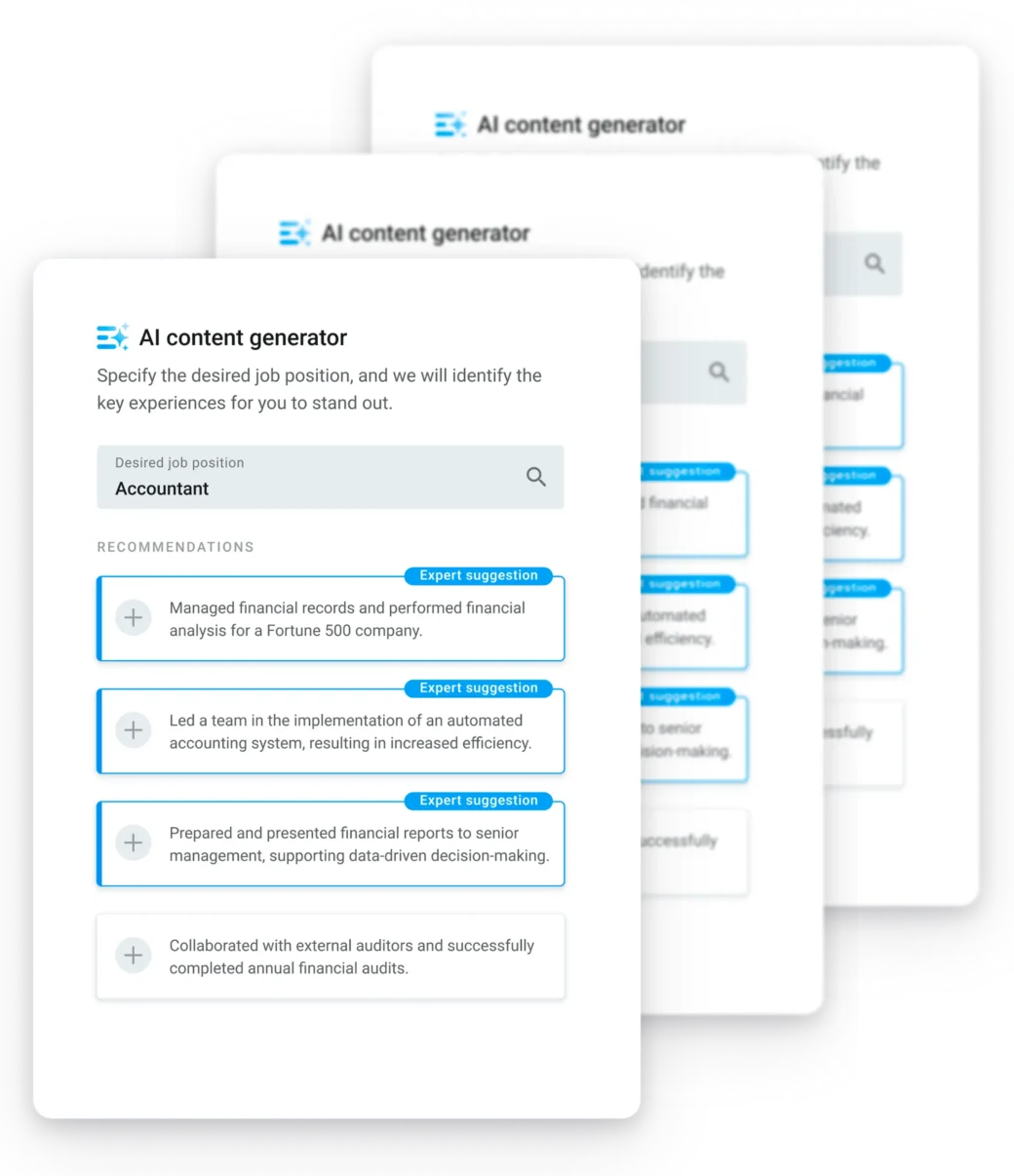The Top Skills To Put on a Resume: Examples and Guide
What skills to include, where to place them on your resume, and how to write them.

- Top 7 Skills To Add to Your Resume
- Hard Skills vs. Soft Skills
- What Is Skills-Based Hiring, and Why Is a Skills Section Important?
- Resume Skills Section Examples
- How To Write The Skills Section of a Resume
- Already Have a Resume? Let AI Fix Your Skills Section
- What Not To Do When Writing Skills For Your Resume
- Over 70 Example Skills To Add To Your Resume
- Key Takeaways
- Resume Skills Sections FAQ
The skills you put on your resume are vital for showing employers your knowledge quickly. Knowing how to write one also helps incorporate vital keywords into your resume naturally and organically.
The following guide explains what skills-based hiring is and why managers pay close attention to your skills section, the difference between hard and soft skills, resume skills section examples, and more
With these tips and our AI-powered resume builder, you can figure out the perfect skills that will impress the hiring manager in your sector.
Top 7 Skills To Add to Your Resume
If you’re unsure which abilities will have the most impact on your resume, here’s a list of the top skills recruiters consistently look for across industries.
| Skill | Description |
|---|---|
| Communication | This is the top soft skill employers seek. The ability to collaborate, present ideas clearly, and build strong relationships (internally and externally) helps you thrive in any work environment. This is especially important in leadership, customer service, and client-facing roles. |
| Digital & AI literacy | Being digitally fluent has now become a non-negotiable. Employers increasingly expect comfort with digital platforms and emerging AI tools (e.g., ChatGPT, Copilot). According to Forbes, this is the most in-demand skill in 2025. Highlighting this shows you stay current and leverage technology effectively. |
| Problem-solving | Every organization values employees who can identify challenges and develop practical, time-saving, and cost-saving solutions. Highlighting your critical thinking, analysis, and troubleshooting skills puts you at the top of the list. |
| Leadership & teamwork | Even if you’re not a manager, demonstrating leadership (mentoring, coordinating, making decisions, guiding) combined with teamwork proves you can work well with others and drive results. If you can, pair this with an example of emotional intelligence to show you can motivate others and create a positive work culture. |
| Adaptability | Change is constant in the modern workplace. Demonstrating flexibility, resilience, the ability to pivot, and a willingness to learn new systems or tools is essential for long-term career success. |
| Data literacy | From spreadsheets to dashboards, being able to interpret and use data in decision-making is critical in nearly every field today. Excel, Tableau, or basic analytics skills add credibility. |
| Project management | Great employees don’t just do their tasks; they excel at organizing tasks, meeting deadlines, and coordinating resources efficiently. Even basic project management skills (using Trello, Asana, or similar) signal reliability and structure. |
-
💡 Expert advice

While these skills are some of the most universally valued, the best resumes always reflect specific examples of how you’ve applied them.
For example, “applied data literacy and problem-solving skills to identify process inefficiencies, saving the company 15% in annual costs.”
Want the right skills faster? Let AI do the research
Take advantage of our AI skills generator can help you include the best skills on your resume in seconds.
Simply enter your desired role, and get a tailored list of the most relevant skills to help your resume stand out to both recruiters and ATS systems.
Hard Skills vs. Soft Skills
When building your resume, it’s essential to show a balance between hard skills and soft skills. Both categories encompass a broad range of technical or social abilities relevant to a working environment. The great thing is, the combination of the two helps create a complete picture of your qualifications
Soft skills for a resume
Soft skills (also known as interpersonal or people skills) are developed over time through experience, collaboration, and communication. The return on soft skill training is well worth it as 85% of career success comes from soft skills according to a LinkedIn report.
Apart from adding soft skills to a specific section, you can add them throughout your resume. Here’s an example of how you can add them to your experience section:
Marketing Manager
ABC Corporation | New York, NY
June 2018 – Present
- Led a cross-functional team to develop digital marketing strategies, improving lead generation by 25%.
- Demonstrated strong communication skills by collaborating with different departments to streamline campaign execution.
- Utilized problem-solving abilities to address client feedback and optimize campaigns, resulting in a 15% increase in customer satisfaction.
Best soft skills to put on a resume
Below are a number of categories of soft skill examples that you can place in your skills section. Decide on what will work best for the role you are applying for.
Communication
- Active listening
- Writing skills
- Teamwork
- Relationship building
Leadership
- Motivating a team
- Delegating tasks
- Conflict resolution
- Goal-setting
Problem-Solving
- Analytical skills
- Decision-making
- Adaptability
- Critical thinking
Time Management
- Prioritization
- Meeting deadlines
- Organization
- Multitasking
Emotional Intelligence
- Building rapport
- Self-awareness
- Empathy
- Managing emotions
Hard skills for a resume
Hard skills refer to more technical, cumulative abilities specific to certain positions or industries. These key skills for your resume are tangible and usually developed through studies, courses, or on-the-job experience.
-
💡 Expert advice

The focus for many employers nowadays is cultivating a positive workplace culture and adapting to technological trends. Employers are looking for employees who have a unique blend of traits that includes contributing to building a positive workplace experience and an understanding of how to use AI tools to increase efficiency and productivity (allowing them to remain competitive in their industries).
Careers that were once focused on hard skills only (i.e. Tech, Government, Engineering) are now looking for candidates who excel in communication, team building, and time management, which contribute to attracting and retaining top talent. On the technical side, employers also want individuals who remain curious and adaptable to learning how to incorporate AI into everyday tasks (i.e. notetaking, editing, coding).
It is important to use a common, general range for measuring your level that all employers understand, such as basic, intermediate, or advanced.
Here’s an example of how you can add hard skills to your summary statement if you were a teacher:
Dedicated and compassionate elementary school teacher with 8 years of experience fostering a positive learning environment. Skilled in curriculum development, classroom management, and differentiated instruction to meet diverse student needs. Proficient in using educational technology tools, such as Google Classroom and Smartboards, to enhance learning
experiences.
Not sure how to include your skills in your resume summary? Try our AI resume summary generator, which can instantly turn your skills and experience into a tailored professional summary.
Best hard skills to put on a resume
Hard skills are especially important when it comes to roles that require strong technical skills.
Check out these hard skills that can improve your resume.
Marketing and design
- Search Engine Optimization (SEO)
- Graphic design (e.g. Canva or Adobe)
- Content creation (Hemmingway, Keyword Surfer, Grammarly)
- Presentation skills (Google Slides, Microsoft PowerPoint, Prezi)
Engineering
- Machine learning (Vertex AI,OpenNN, Microsoft Azure)
- Programming languages (Python, Java, C++)
- Data analysis
- AI skills (GitHub Copilot, Poe AI, Notion AI)
IT and Software Development
- Network security
- Data management
- Software development
- Proficiency in tools like Salesforce or Google Analytics
Languages and Communication
- Foreign languages (including the level or certification you have)
- Typing speed
Project management
- Data analysis
- Project planning
- Resource allocation
- Time management

Import Your Resume or Build a New One from Scratch
Give your resume a facelift for free! Import it to our resume builder, choose a template, and freshen it up in minutes.
What Is Skills-Based Hiring, and Why Is a Skills Section Important?
Instead of filtering candidates by degrees, job titles, or experience, companies are focusing on real-world skills, the ones that really matter for job success.
This approach helps close skills gaps, brings in top talent, and creates a more inclusive hiring process. It doesn’t shut out great candidates just because they took a non-traditional path to gain their expertise, and it doesn’t discriminate against either entry-level or older workers.
Skills-based hiring shifts the focus to competency-based evaluations, which is why you need a strong resume skills section.
We conducted interviews with recruiting experts Stephen Chu and Elio Recchia to gain insight into this recruiting trend.
Why do some recruiters prefer skills-based hiring?
In a conversation with Stephen Chu, Chief Legal & Administrative Officer at InStride, he explained why skills-based hiring is preferred today.
“To drive real change, companies must build a skills taxonomy to identify core competencies, align hiring managers on skills criteria, and update recruitment metrics accordingly. When done right, this approach expands talent pools, reduces barriers, and ensures businesses hire for capability rather than credentials, strengthening workforce agility and long-term success.”
How to write a skills-focused resume
When asked about this hiring trend among industries, Elio Recchia, Vice President of Hays Americas, explained:
“Recruiters are increasingly using AI and automation to filter candidates based on skills, especially for roles with a high number of applications. Using keywords from the job description, providing specific examples of how they have applied their skills in previous roles, and using a clear and easy-to-read resume format can also help ensure their information is easily accessible to automated systems.”
How do you know if you’re a strong candidate for skills-based hiring?
Elio Recchia, Vice President of Hays US, went on to share with us that:
“The technology industry has been a pioneer in adopting this approach due to the rapid pace of technological advancements and the need for specific technical skills. Creative industries like graphic design, marketing, and content creation often prioritize portfolios and practical skills over formal education. In certain areas of high-tech manufacturing and engineering, skills-based hiring is also becoming more prevalent.”
The future of hiring: what’s next
Stephen Chu, Chief Legal & Administrative Officer at Instride, also shared:
“most forward-thinking companies aren’t just hiring for today; they’re building a workforce for the future by developing talent, growing employees’ skills into strategic business areas, and creating real career opportunities.”
Resume Skills Section Examples
Your skills section is one of the most important parts of your resume. It gives hiring managers and Applicant Tracking Systems (ATS) a quick snapshot of what you bring to the table. A well-written list of relevant and marketable skills can set you apart from other applicants!
Let’s start with the basics. Take a look at the following examples to get an idea of what skills to put on a resume.
General resume skills section example
This example of a skills section on a resume will help you understand how to list your most valuable skills and make them align with your position.
Skills
Technical Skills:
- Proficient in Python, Java, and JavaScript
- Advanced knowledge of Microsoft Office Suite (Word, Excel, PowerPoint)
- Experienced in Adobe Creative Suite (Illustrator, Photoshop, InDesign)
- Skilled in using project management tools like Trello, Asana, and Monday.com
Languages:
- Fluent in English and Spanish
- Basic proficiency in French
Soft Skills:
- Strong communication and interpersonal skills
- Team player with the ability to collaborate effectively
- Proven adaptability and problem-solving in fast-paced environments
- Resilience, organization, and time management skills
- Excellent customer service and relationship-building expertise
Industry-Specific Skills: (Tailor according to the job role)
- Proficiency with AutoCAD and SketchUp (for design or architecture roles)
- Experience with CRM software, such as Salesforce
- Knowledge of digital marketing tools, such as Google Analytics, for marketing jobs
- Familiarity with editing software, such as Final Cut Pro
New graduate resume skills section example
If you’re a recent grad or finishing university without a lot of work experience, you can include skills you’ve gained through school, projects, clubs, or internships. Here’s an example of how a new graduate might format their skills section to highlight both hard and soft skills.
Skills
Technical & Tools:
- Proficient with Microsoft Office Suite (Excel, Word, PowerPoint)
- Experienced Google Workspace (Docs, Sheets, Slides)
- Extensive knowledge of Canva, Slack, and Zoom
Soft & Transferable Skills:
- Strong written and verbal communication
- Presentation skills (virtual and in-person)
- Problem-solving and analytical thinking
- Time management and organization
- Teamwork and collaboration in small and large group settings
- Adaptable, curious, and quick to learn new programs and processes.
Language & Other Relevant Skills:
- Basic proficiency in Spanish
- Fluent in English and Mandarin
Even without professional experience, you can still stand out by highlighting transferable skills. It’s likely that you’ll have gained many of these skills throughout your studies, and they can be helpful to include when applying for entry-level positions.
Employers are always looking for employees who can bring transferable skills to the job, so think about any other skills you’ve gained through your studies, volunteering, or participating in clubs or sports.
💡Tip
Whether you’re an experienced professional or a new graduate, keep your skills section concise, relevant, and keyword-rich. Align your skills with the job description and ensure that your most valuable skills are easy to find at a glance.
How To Write The Skills Section of a Resume
Presenting your skills on a resume effectively requires thought, precision, and a bit of strategy.
Essentially, the key is to emphasize relevance and fit. This begins with a keen study of the job description. It’s there where you’ll find a dictionary of keywords that should resonate through your skills section.
The idea is not to echo these skills verbatim, but to filter them through your own experiences and proficiency. Each skill should reflect a facet of the job role.
Adapting your skills section for ATS
Every time you apply for a job, you should adapt your skills section to match the job description. This can help you get past ATS filters.
You should always make sure to mirror the exact phrasing used in the job ad. For example, if the job ad specifically asks for “Microsoft Excel skills,” make sure you include this word-for-word, instead of something like spreadsheets or Microsoft Office.
Keep your section title simple with “Skills,” use plain text formatting, and combine acronyms with full terms so that both humans and ATS software pick them up.
To make sure that your professional and personal (hard and soft) skills are relevant, you can do the following:
- Analyze the job description
- Research industry-specific skills
- Highlight relevant experience
- List transferable skills that can be used from your previous sector
- Prioritize soft skills if you don’t have transferable skills
Remember, the more precise your skills are, the more they resonate with employers.
Already Have a Resume? Let AI Fix Your Skills Section
Our AI resume builder helps you refine your skills section, improve wording, and add role-relevant keywords so your resume aligns with job descriptions and ATS requirements. Simply upload your resume and get an instant resume upgrade.
You can also use the builder to generate a new resume from scratch with AI. Just answer a few question about the roles you’re interested in and your experience, and you’ll get a professional resume fully tailored to the job.
What Not To Do When Writing Skills For Your Resume
Even the most impressive skill section can lose impact if it’s not presented the right way. To make sure yours stands out, avoid these common pitfalls:
- Avoid vagueness and ambiguity: The skills section of your resume is no place for generalities or undecipherable jargon. Employers want specific examples.
- Don’t present an exhaustive list of skills: Keep the list concise and focused, preventing it from becoming a bloated endorsement of every single skill you’ve ever acquired.
- Keep a balance between hard skills and soft skills: While hard skills demonstrate your technical prowess, soft skills are often the deciding factor for recruiters.
By steering clear of these, you can craft a skills section that not only accurately represents your abilities but also resonates with potential employers.
Want to double-check if your skills section meets recruiter standards? Use our resume checker to get feedback and make sure your resume is perfect.
-
💡 Our expert’s advice

Review your resume like a hiring manager. Ask yourself, “If I were scanning this for 6 seconds, would I immediately spot the skills that matter?”
Over 70 Example Skills To Add To Your Resume
It is important to include a range of abilities in your resume that encompass general skills as well as job-specific skills or sector-specific skills.
Your goal is to choose a balanced mix of technical, soft, and transferable skills that highlight your strengths and readiness for the role. We can help!
Below, you can check out a variety of specific keywords for various industries to help you get started.
IT skills or computer-based program knowledge are highly favorable among employers today, and they should be listed prominently in your resume. Examples of technical skills to include on your resume are:
- Microsoft Office (Excel, PowerPoint, Word)
- Access
- QuickBooks and Accounting Software
- Social media management software
- Adobe Creative Suite (Photoshop, Illustrator, InDesign)
- iOS / Android
- AutoCAD
- Java
- CMS
- CSS
- Google Analytics and SEO Tools
- Google Drive
- HTML
- Database Management (MySQL)
- Ruby
- PHP
- UI/UX Design Principles
Below are common categories of resume skills you can research and include in your resume to fit the job sector you want to work in, such as blue-collar jobs, management positions, administrative roles, and more.
- Financial Forecasting and Budget Management
- Business intelligence reporting
- Market trend and competitor analysis
- Cash flow management
- Cost-benefit analysis
- Risk assessment and mitigation
- Data-driven decision-making
- Auditing and Compliance Oversight
- Stakeholder communication
- Cross-functional collaboration
- Client relationship management
- Conflict resolution and mediation
- Public speaking and presentations
- Persuasive writing and pitching
- Cross-cultural communication
- Active listening and empathy
- Negotiation and Conflict Resolution
- Strategic Planning and Goal Setting
- Team building and motivation
- Performance management
- Mentoring and coaching
- Change management
- Project Coordination and Delegation
- Conflict management in teams
- Employee engagement strategies
- Agile project management
- Document management and filing systems
- Meeting coordination and minute-taking
- Calendar management and scheduling
- Travel arrangement and logistics
- Office supply tracking and resource management
- Data entry and database management
- Time tracking and productivity optimization
- Workflow automation and optimization
- Brand strategy development
- Content creation and copywriting
- Social media marketing
- Search engine optimization (SEO)
- Email campaign management
- Graphic design and visual communication
- Video production and editing
- Marketing analytics and reporting
- Carpentry and woodworking
- Electrical wiring and troubleshooting
- Plumbing installation and repair
- Welding and metal fabrication
- Masonry and concrete work
- HVAC installation and maintenance
- Roofing and waterproofing
- Blueprint reading and interpretation
- Equipment operation and maintenance
- Assembly line operation
- Quality control and process auditing
- Forklift operation and material handling
- CNC machine programming and operation
- Inventory management and stocktaking
- Equipment maintenance and repair
- Lean manufacturing principles
- Occupational health and OSHA compliance
Key Takeaways
Building a strong skills section is more than just filling space on your resume, it allows you to strategically position yourself as the best fit for the role. This section doesn’t have to be overwhelming. Using a template and resume builder can make adding relevant or transferable skills to your resume much easier.
However, adding your hard and soft skills needs to be done carefully, which is why it’s critical to remember:
- Mix in your hard and soft skills throughout your resume
- Highlight the most relevant skills
- Focus on 10-15 hard and soft skills
- Study the job description to know which skills to add
Continue to update your skills regularly. Remember, your career evolves and so should you resume. Revisit your skills section every 6 to 12 months to remove outdated tools and add new skills. This small habit helps keep your resume current and competitive.
As the old saying goes, “skills pay the bills”, and with these tips and tools, you’ll know exactly what to add to your resume to land an interview for your dream job!
Resume Skills Sections FAQ
Still have questions about how to write a resume that highlights your best skills? You’re not alone. Here are the answers to some of the most common questions people have about the best ways to include their skills on their resume.
Start by carefully analyzing the job description and highlighting repeated keywords, tools, and competencies. Then cross-check these with your own experience.
Choose the skills that overlap directly and match the role’s requirements. Tailoring your list for each application increases your chances of getting past ATS filters.
Yes, strategically. Your skills should appear in more than one section, but it shouldn’t look overly repetitive. Best practice is to list your key abilities in the Skills section, but also reinforce them in your experience or summary with examples of how you used them.
For example, listing “Project Management” under Skills and showing “Led a cross-functional project that reduced costs by 15%” in Experience highlights your strengths.
You can include emerging skills, but be transparent about your level. Use labels such as “Basic” or “Familiar with” to show you’re working on them. You can also mention them in context, like coursework or side projects, to demonstrate initiative without overstating your expertise.
It depends on how many you have. If a certification or course is directly relevant to the job, you can include it in your Skills section under a subheading like “Tools & Certifications.” If you have several, it’s better to create a separate section, so your skills list stays clear and focused.
Yes, potentially. Many ATS systems can’t read icons, tables, or charts. Stick to simple formatting. Try using a standard heading like “Skills” and use clean text formatting. Avoid icons, graphics, or tables for this section to make sure your skills are picked up correctly and don’t get missed by automated systems.
Finding the perfect balance is key. Too few skills could appear unimpressive, while an abundance of skills might be irrelevant and do more harm than good.
The objective is to feature your most relevant skills tailored to the job you’re targeting. For most job seekers, listing 10-15 skills throughout your resume is generally adequate.
It’s important to understand that quality always outweighs quantity. It may be tempting to list every skill you’ve ever developed, but the truth is, not all skills belong on a resume.
Listing skills on your resume strategically grants potential employers insight into your assets at the right time.
For most professionals with solid, relevant experience in their field, it’s standard to place the work experience section before the skills section. This approach highlights your achievements and career context right away, while still allowing recruiters to scan your key abilities further down the page.
If you are an entry-level candidate, a recent graduate, or switching industries, placing the skills section after the resume summary or objective and before the work experience section is deemed effective.


